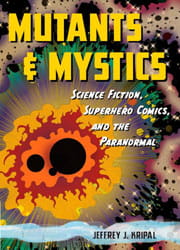 Note: Jeffrey Kripal's new book, Mutants & Mystics, will be featured November 1-15 at the Patheos Book Club.
Note: Jeffrey Kripal's new book, Mutants & Mystics, will be featured November 1-15 at the Patheos Book Club.
Consider two opening scenes.
Scene One. It's, I don't know, let's just call it the fourteenth century. Meister or "Master" Eckhart is preaching around Germany of an inner light that makes humans divine and of a power beyond space and time that he calls the eternal Now. This light literally takes away time and space, the professor insists, and renders any human being upon whom it falls divine. To employ a modern scientific register, such a soul is outside space-time. To employ the traditional theological terms, such a being is infinite and immortal, since, as Eckhart points out, if something exists outside space and time, it cannot age, it is not born, nor can it ever die. Such a divine human now moves among men secretly, incognito, unrecognized. Compared to such a being, Eckhart wryly observes, the normal lot of humanity is like a "man painted on a wall."
Scene Two. It's 1994. The Scottish comic book writer Grant Morrison is on a kind of pilgrimage in Kathmandu, Nepal. After visiting a Buddhist temple, he goes back to his hotel room, where he encounters what he describes as some shining, mercurial, fifth-dimensional anti-bodies, who initiate a mystical opening that was like "being electrocuted by God" and peel him off of space-time in order to show him "things as they were, from the outside." This contact event became the template for his comic writing, as he learned to take this gnosis and apply it to his three-dimensional relationship to the two-dimensional comic page, where the figures do indeed exist as if "painted on a wall." He also came to understand that all of life on this planet is one huge morphing meta-organism, that the divine has descended into matter, and that matter is condensed divinity pushing us, evolving us to "the next rung up the ladder."
Mystics and mutants, then.
I just finished a book-length study of a dozen or so major pulp fiction, sci-fi, comic book, and fantasy authors and artists. It is remarkable how much they sound like mystics. That's because they are. Their chosen medium and symbolic frames, of course, are very different from what we have come to expect, but they come back, again and again, to what both Eckhart and Morrison appear to have realized: the hyperdimensional soul. For all of these individuals, the Human is Two: a constructed, relative, finite ego; and a timeless, spaceless, infinite Mind. I should add that it does not look at all like these artists are simply speculating or imagining such things. It looks rather like they are describing and confessing such truths out of their own mystical encounters.
Consider the following. Whitley Strieber, the horror writer who came to know multiple out-of-body states, ecstatic visions, and psychical experiences after a massive abduction experience in 1985, came to know the soul as separate from the body, as "some form of conscious energy, possibly electromagnetic in nature." Similarly, Philip K. Dick, the great sci-fi master, remembered who he really was after—are you ready for this?—he was radiated for two months in the winter of 1974 by a pink plasmic presence that he experienced as a superconscious Self, maybe himself, evolving his present self from the future.
What did he remember? That he was an immortal being living in the world but not of this world. He recognized his own doubleness in the secret gray-robed Christians, that is, in the ancient Gnostics.
Then there is Barry Windsor-Smith. Through a summer of traumatic metaphysical openings, paranormal experiences, and terrifying cosmic visions in 1973, the legendary fantasy artist came to realize that Mind is not brain, that there is a kind of "transconscious" outside of the "space-time oriented ego." Raymond Palmer, the pulp fiction editor of the 1940s and 50s who did so much to make paranormal powers and the flying saucer the very essence of the sci-fi imagination, would have agreed. He claimed to remember things before he was born. He also claimed to dream clairvoyant dreams (which he then wove into his short stories) and to have come into contact, like Plato, with the source-house of all knowledge, past, present, and future.
These, of course, are all impossible claims.
But why? Is it because they come to us in modern English instead of in Attic Greek or Middle High German? Is it because they come to us as, well, us? Best to tie down the soul again, to history (time), context and culture (space), language, brain, body, whatever. Best not to listen to one of Morrison's hyperdimensional aliens as he pleads with us, the three-dimensional reader literally peeled off his own two-dimensional page: "The soul is not in the body. The body is inside the soul. Do you understand? Look. We are you. Try to remember."
Dick claimed to remember. So did Eckhart, Strieber, Windsor-Smith, and Palmer. They no longer lived in Flatland. They no longer lived like a man painted on a wall.
10/28/2011 4:00:00 AM




